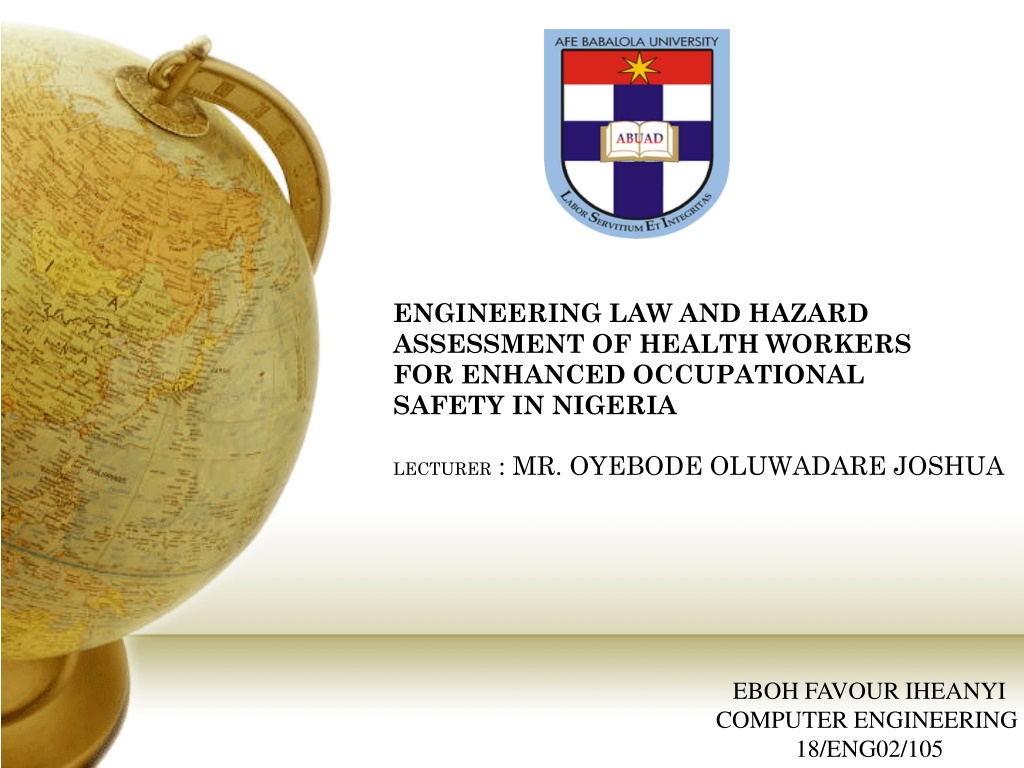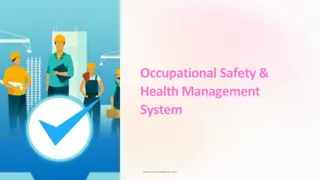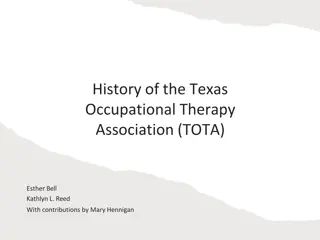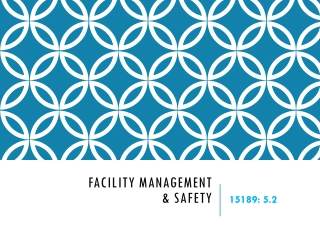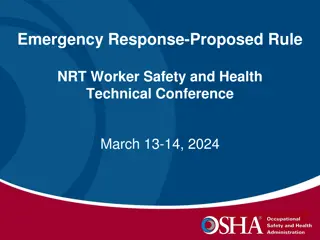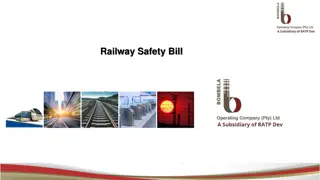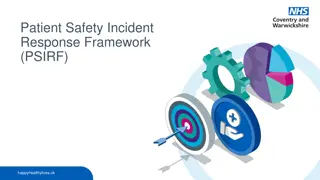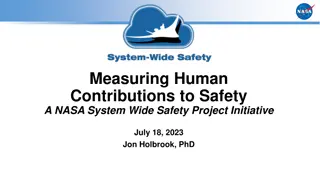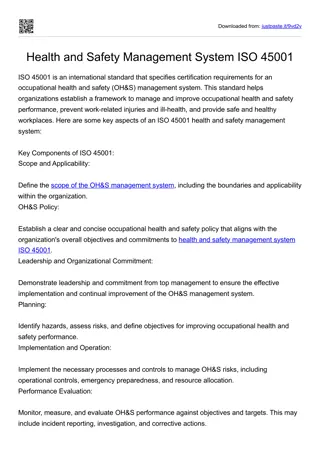Occupational Safety and Health Enforcement in Nigeria: Challenges and Recommendations
This paper discusses the enforcement of occupational safety and health (OSH) regulations in Nigeria, highlighting the key issues affecting compliance and suggesting ways to improve enforcement. The study emphasizes the importance of maximum enforcement and organizational compliance with OSH regulations for enhanced occupational safety. Recommendations include adopting self-regulatory approaches, recruiting more OSH inspectors, empowering local government authorities, and encouraging organizations to take a proactive role in OSH enforcement.
Occupational Safety and Health Enforcement in Nigeria: Challenges and Recommendations
PowerPoint presentation about 'Occupational Safety and Health Enforcement in Nigeria: Challenges and Recommendations'. This presentation describes the topic on This paper discusses the enforcement of occupational safety and health (OSH) regulations in Nigeria, highlighting the key issues affecting compliance and suggesting ways to improve enforcement. The study emphasizes the importance of maximum enforcement and organizational compliance with OSH regulations for enhanced occupational safety. Recommendations include adopting self-regulatory approaches, recruiting more OSH inspectors, empowering local government authorities, and encouraging organizations to take a proactive role in OSH enforcement.. Download this presentation absolutely free.
Presentation Transcript
ENGINEERING LAW AND HAZARD ASSESSMENT OF HEALTH WORKERS FOR ENHANCED OCCUPATIONAL SAFETY IN NIGERIA LECTURER : MR. OYEBODE OLUWADARE JOSHUA EBOH FAVOUR IHEANYI COMPUTER ENGINEERING 18/ENG02/105
Abstract This Paper examines the enforcement of occupational safety and health (OSH) regulations; it validates the state of enforcement of OSH regulations by extracting the salient issues that influence enforcement of OSH regulations in Nigeria. It s the duty of the Federal Ministry of Labor and Productivity (Inspectorate Division) to enforce the Factories Act of 1990, while the Labor, Safety, Health and Welfare Bill of 2012 empowers the National Council for Occupational Safety and Health of Nigeria to administer the proceeding regulations on its behalf.
Abstract Sadly enough, the impact of the enforcement authority is ineffective, as the key stakeholders pay less attention to OSH regulations; thus, rendering the OSH scheme dysfunctional and unenforceable, at the same time impeding OSH development. For optimum OSH in Nigeria, maximum enforcement and compliance with the regulations must be in place. This paper, which is based on conceptual analysis, reviews literature gathered through desk literature search. It identified issues to OSH enforcement such as: political influence, bribery and corruption, insecurity, lack of governmental commitment, inadequate legislation inter alia.
Abstract While recommending ways to improve the enforcement of OSH regulations, it states that self-regulatory style of enforcing OSH regulations should be adopted by organizations. It also recommends that more OSH inspectors be recruited; local government authorities empowered to facilitate the enforcement of OSH regulations. Moreover, the study encourages organizations to champion OSH enforcement, as it is beneficial to them; it concludes that the burden of OSH improvement in Nigeria is on the government, educational authorities, organizations and trade unions.
Introduction Conceptual Clarification Occupational safety and health (OSH) OSH is an interdisciplinary area that involves protecting the health, safety and welfare of people in the workplace (Kalejaiye 2013) and others that may be affected directly or indirectly by the activities at the workplace. There are sets of rules, regulations, legal instruments or provisions that help in actualizing the above; for the purpose of this study, they are called OSH regulations.
Enforcement According to Cambridge dictionary (2013), enforcement is described as the act of ensuring that people obey a law or comply with it. Based on the above definitions, enforcement of OSH regulations is described as the act of ensuring observance to OSH laws hereinafter. Enforcement of OSH Regulations Literature reviewed so far reveal that OSH regulations enforcement approaches are identified as reactive approach and the proactive & collective participatory approach.
OCCUPATIONAL SAFETY AND HEALTH (OSH) LEGISLATION IN NIGERIA
Occupational safety and health (OSH) legislation in Nigeria OSH legislation in Nigeria The inception of OSH regulations/bills in Nigeria runs from the introduction of the Labor Act of 1974 to the passage of the Labor, Safety, Health and Welfare Bill of 2012 (which awaits the presidential assent). A bill is a formal statement that is designed to be a new law but is under debate before it is voted on (Cambridge dictionary 2013). After voting, it may also need presidential assent to fully complete the process of becoming a law or legislation. During the above period, the Factories Act of 1987 (now known as Factories Act of 1990), which Kalejaiye (2013) reports as a substantial revision of the Factories Act of 1958 (i.e. colonial legislation), the Workman s Compensation Act of 1987, the Labor Act of 1990
Occupational safety and health (OSH) legislation in Nigeria the Workman s Compensation Act of 2004, the Employee s Compensation Act of 2011 (which repeals the Workman s Compensation Act of 2004) were introduced; some of these laws are criticized as inadequate. For instance, the Factories Act of 1987 does not include the construction industry in the definition of its premises (Diugwu et al. 2012; Idoro 2008, 2011); consequently, the industry remains unregulated. Idubor & Osiamoje (2013); Okojie (2010) contend that the severities of penalties stipulated by OSH laws in Nigeria are insignificant; in that offenders are not deterred by the penalties.
Occupational safety and health (OSH) legislation in Nigeria Thankfully, the new Bill (The Labor, Safety, Health and Welfare Bill of 2012) addresses all the above issues, as it includes the construction industry in the definition of its premises and stipulates severe penalties for violation. This bill covers both the formal and informal industrial sectors in Nigeria. It seeks to repeal the Factories Act and serve as a comprehensive OSH legislation for the workplace.
Enforcement of OSH regulations in Nigeria Enforcement of OSH regulations in Nigeria The Labor, Safety, Health and Welfare Bill of 2012 empowers the National Council for Occupational Safety and Health to: enforce and implement OSH measures in the workplace; promote the protection of lives & properties; promote OSH awareness; carry out inspection of the workplaces and monitor the compliance of all regulations or other OSH measures enshrined in the Bill. Correspondingly, the Nigerian Social Insurance Trust Fund Management Board implements the Employee s Compensation Act of 2011, which makes provisions for compensation for any death, injuries, and diseases or disabilities due to employment. In the mean time,
Enforcement of OSH regulations in Nigeria The Factories Act Cap 126, laws of the federation of Nigeria 1990 enables the Inspectorate department of the Federal Ministry of Labor and Productivity to enforce the minimum standard requirements of the Factories Act of 1990 in Nigeria. The enforcement processes require issuing of warning or notices to offenders, after which the lower level of enforcement, which includes the sealing of a defaulting factory, takes place (Okojie 2010). Regrettably, this is not practicable in Nigeria in that the resources required are under estimated and not made available. In affirmation, Okojie (2010) reports that the sealing of premises, which is a form of enforcement rarely happens in Nigeria. Also, Adeogun & Okafor (2013) note that unhealthy exposures to risks of workers in organizations make it evident that OSH laws are not enforced in Nigeria.
Enforcement of OSH regulations in Nigeria The argument therefore is that there should be daily inspection of workplaces by the factory inspectors and monthly reports to the Federal Ministry of Labour and Productivity (Okojie 2010), but this is farfetched. Moreover, Ezenwa (1997) in Ezenwa (2001) found that the annual average of factory inspectors from 1987 to 1994 is 55.75 (where the annual average of registered factories in Nigeria from 1987 to 1994 is 4923), and Okojie (2010) states that there are only 60 factory inspectors in Nigeria. These create room for pondering as to why more enforcement officers cannot be employed. Nigeria is the most populous country in Africa with a population of over 165 million, so 60 inspection officers are far too few to enforce the OSH regulations in Nigeria. It is therefore not misleading to assert that lack of person power and lack of commitment to ensuring better enforcement in the part of the enforcement authorities hinder optimum enforcement of OSH regulations.
Enforcement of OSH regulations in Nigeria Equally important, a study by Diugwu et al. in 2012, shows that majority of construction workers in Minna, Nigeria (if not in the whole country) are not aware of the body responsible for enforcing OSH regulations in the industry. In the study, about 79.5 % of the respondents could not identify the correct body responsible for OSH enforcement in Nigeria. This suggests lack of knowledge as per OSH and its ineffective enforcement. Granted that there is proper enforcement of the OSH regulations across Nigerian industries, the workers will be aware, as they must have heard of or seen the enforcement taking place. In view of these highlighted deficiencies, it is pertinent to further examine the key issues to enforcing OSH regulations in Nigeria; thus, the subsequent section addresses this
KEY ISSUES TO ENFORCEMENT OF OSH REGULATIONS IN NIGERIA AND WAYS OF IMPROVING OSH ENFORCEMENT IN NIGERIA
Key issues to enforcement of OSH regulations in Nigeria 1.Lack of skilled person power 2. Political influence 3. Severity of penalties 4. The judicial system 5. Corruption and bribery 6. Inadequate funding 7. Lack of governmental commitment
Ways of improving OSH enforcement in Nigeria 1.Recruitment and training of enforcement officers by the enforcement authority. 2.Adoption of self-regulatory style of enforcement by organizations. 3.Introduction of enforcement of OSH regulations at local level. 4.Making provisions for adequate OSH information. 5.Development and adoption of Approved Code of Practice (ACOP). 6.Updating and revising OSH regulations as required by relevant authorities.
Conclusion The aim of this paper is to examine the OSH regulations in Nigeria and to unearth the issues hampering its enforcement. It demonstrates the ineffective nature of the enforcement of OSH regulatory protocols in Nigeria. The paper also establishes a conscious view by authors that the absence of effective enforcement of OSH regulations in Nigeria by those responsible and the authority in particular motivates the call for effective self-regulatory enforcement system to be adopted. Given the rapid economic growth and infrastructural development in Africa and Nigeria in particular, the absence of the state involvement in OSH promotion and enforcement is of great concern.
Conclusion Therefore, requires prompt attention otherwise the economic growth may be hampered. Likewise, organizations should understand the importance and benefits of compliance with OSH in the work environment as enabler to increased safety, productivity, competitive advantage, accident and fatality reduction and above all the consequences of tarnished images of the organization and that of the country at large. Especially, with the digital world where growing application of information technology (social network), which delivers information on the instant can damage the reputation of nations and industries at large.
Conclusion Suggested Area of Further Study As there is only one OSH enforcement body in Nigeria, a case study should be conducted to further identify factors that influence the enforcement of OSH nationally. This review paper is just a stepping-stone for further research and will act as a compliment to the required case study; however, case study on its own may not be the means to an end as it could also be biased. This is because the Federal ministry of Labour and Productivity (Inspectorate Division) may not provide correct information, or may provide only favorable information.
References Adeogun, B. K., and Okafor, C. C. Occupational Health, Safety and Environment (HSE) Trend in Nigeria. International Journal of Environmental Science, Management and Engineering Research, 2013. Vol 2 (1), pp 24-29. Anderson, J. Health and Safety- matching legislation and enforcement. Proceedings of the institute of Civil Engineers Management, Procurement and Law, 2007. Pp. 11-15. Cambridge Dictionaries Online. Cambridge University Press. Source: http://dictionary.cambridge.org/dictionary/british/enforce?q=Enforcement. 2013 (Accessed: 31-10-13). Diugwu, I. A., Baba, D. L., and Egila, A. E. Effective Regulation and Level of Awareness: An Expose of the Nigeria s Construction Industry. Open Journal of Safety Science and Technology, 2012. Vol. 2, pp 140-146. Ezenwa, A. O. A Study of Fatal Injuries in Nigerian Factories. Society of Occupational Medicine, 2001. Vol. 51 (8), pp 485-489. Federal Republic of Nigeria. Labour, Safety Health and Welfare Bill. 2012.
